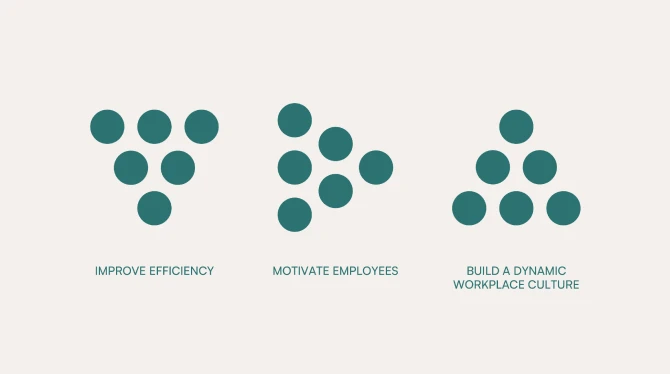💼
How To Choose The Right Social Media Channels For Your B2B Business?
LAST UPDATED 16 May, 2024
We can all agree that in today’s digital age, having a well-crafted social media marketing strategy is crucial for the success of any B2B business.1
With that in mind, let us look at the following scenario:
You own a B2B business. You know that you need a social media presence, so you start looking at how other B2B businesses do social, so obviously, you look at the ones who do it well. What you see is beyond good: they are present on basically every platform, they produce a ton of top-notch content, their reach is through the roof, and their engagement levels could put any B2C business to shame.
So naturally, you think to yourself – this is how it’s done. This is what I need to do.

But the truth is, you only see the end result. You don’t see the enormous budget this company dedicated to social media and content creation, you don’t see the top-notch team they hired, and you don’t see all the time and planning that went into getting there.
On the other hand, your marketing team consists of one person, and your budget is way below the industry standard. So what do you do in a situation like that?

Below is Part 1 of a comprehensive guide that will teach you how to create a sustainable social media strategy for your B2B business, starting with choosing the right platform(s).
Factors to Consider When Choosing Social Media Channels
When choosing the right social media channels for your B2B marketing strategy, several factors should be taken into consideration:
- Firstly, consider your target audience. Where do they spend their time online? What platforms do they use to engage with businesses and industry professionals?
- Secondly, evaluate the nature of your products or services. For example, Meta and TikTok are highly visual and focus on short-form, entertaining content. While this format can work well for B2C and D2C businesses looking to capture attention and engage consumers, it may not be as suitable for B2B businesses that need to convey complex information or demonstrate the value of their products or services in a more detailed manner.
- Additionally, consider the resources and capabilities of your business. Can you consistently create and share high-quality content on a particular platform? Do you have the bandwidth to engage with your audience on multiple channels? By considering these factors, you can make an informed decision and choose the social media channels that align with your target audience and marketing objectives.
Identifying the Right Social Media Channels for B2B Marketing
A B2B marketing strategy is a roadmap that outlines the steps and tactics needed to reach and engage with potential customers and convert them into loyal clients.
That being said, here is what I firmly believe – the only two channels that make sense for B2B marketing are LinkedIn and X (formerly Twitter). Here is why:
- First of all, one marketing person cannot manage more than two social media channels.2 Each platform has its unique audience, content requirements, engagement strategies, and analytics to track, demanding significant time and effort to maintain quality and consistency. By spreading too thin across numerous channels, marketers risk diluting their messaging, neglecting audience engagement, and failing to optimize their strategies for each platform’s specific nuances.

Image source: https://www.socialsuccessmarketing.com/social-media-marketing-misconception/ - When it comes to B2B marketing, not all social media channels are created equal. Different platforms cater to various demographics and industries, so it’s crucial to identify the ones that align with your target audience and business objectives:
- LinkedIn, for example, is a popular choice for B2B companies as it is a professional networking platform that allows businesses to establish thought leadership, build relationships, and generate leads.
- X (Twitter), on the other hand, can be used to share industry news, engage in real-time conversations, and connect with industry leaders, potential clients, and partners.
- Platforms such as Meta and TikTok were not created with B2B companies in mind:
- Users: The majority of users are typically consumers rather than decision-makers within businesses.
- Content and intent: Meta and TikTok are visual platforms that focus on entertaining content. This type of content requires that you invest a ton of resources (time, money, and effort) over and over again, with no guarantee of success.
- ROI: Creating this type of content mentioned above is While Meta and TikTok can drive brand awareness and engagement, the impact on lead generation, sales, and overall business growth is questionable.

Using Social Media for B2B Lead Generation
Social media platforms offer various tools and strategies that B2B companies can leverage to attract potential leads, engage with their audience, and ultimately drive conversions.3
- Content Marketing: Sharing valuable content such as blog posts, whitepapers, case studies, and industry reports can establish your company as a thought leader in your field and attract potential leads who are interested in your expertise.
- Targeted Advertising: One of the key benefits of using social media for lead generation is the ability to target specific demographics and industries. Platforms like LinkedIn and Twitter offer powerful targeting options that allow businesses to narrow down their audience based on job titles, industries, and interests.
- Networking: Networking with industry professionals can help build relationships and credibility, ultimately leading to potential leads.
- Social Selling: Sales teams can use social media to identify and connect with potential leads, nurture relationships, and ultimately convert them into customers.4
TL;DR
- Focusing on a smaller number of channels will allow your marketing team (or person) to allocate resources more efficiently, maintain higher-quality content, and achieve better results in terms of audience engagement and overall marketing effectiveness.
- By understanding your target audience, evaluating the nature of your products or services, and considering your business resources and capabilities, you can make informed decisions about which social media channels to utilize.
- Social media platforms provide opportunities for businesses to showcase their expertise, share valuable content, and establish credibility within their industry. By consistently providing valuable insights and solutions, businesses can position themselves as trusted authorities, making it easier to attract and convert leads.
Wanna talk about your B2B social media strategy? ➝ book a consult


